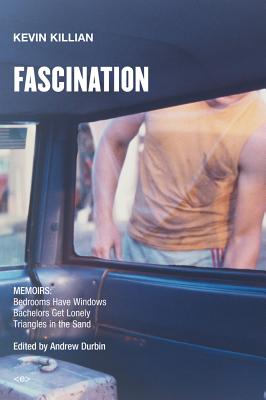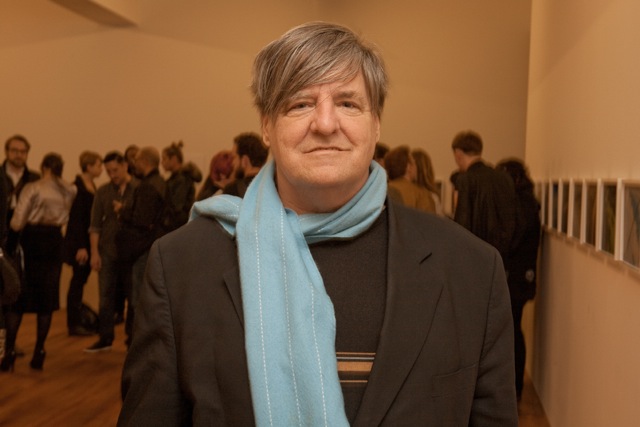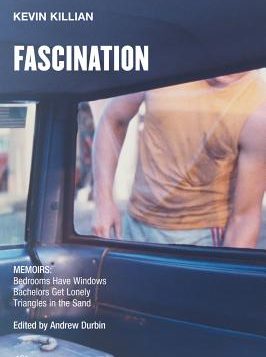 Fascination: Memoirs
Fascination: Memoirs
by Kevin Killian
Semiotext(e). 312 pages, $16.95
KEVIN KILLIAN is a “tortoise” of a writer who is steady and determined and in it for the long haul. The proof is this handsome and handy volume comprised of three memoirs. The first, Bedrooms Have Windows, was controversial when it appeared in 1989. Next is an unpublished prose work from the mid-’90s titled Bachelors Get Lonely. The third, shorter memoir, Triangles in the Sand, is a new and previously unpublished memoir.
I read Bedrooms Have Windows when it came out and recommended it, but as Killian himself admits in the second memoir in a hypothetical interview between his nineteen-year-old self and his present-day self, the book barely sold and was hardly read. Too bad. It holds up like a good wine. It is charming, funny, and mature, despite being about a gay teenager living in suburban Long Island trying to get laid. Given the material, the narrative could have gone off the rails. Instead it is always modest, sometimes self-deprecating, and at times hilariously funny. I suppose that one consequence of indifference to commercial book success is the carefree attitude so brilliantly on display here.
That same attitude informs Bachelors Get Lonely, which bumps Killian up a few years to a time when he was still in Smithtown, Long Island, waiting tables and also being passed around by a clique of homo Catholic priests. He escapes them only to become romantically screwed up yet again, fending off a cute rich kid while trying to get the attention of guys who don’t care. Killian confirms with detailed knowledge exactly how deliciously awful all of that can be.
He is by his own admission a “New Narrative” writer. In Bachelors Get Lonely he offers small biographies of several of his coevals that are deadly accurate while remaining affectionate. In his brief introduction to this volume, Andrew Durbin writes: “New Narrative, with its emphasis on critical theory and identity politics, offered a fiction and poetry that took itself apart in order to make its inner and outer workings—and worker—transparent; a writing about the writer who’s doing the writing, a kind of authorial heroism, the splaying of the self.” He goes on: “The author is foregrounded through repeated intervention of a writerly interest.”
Well-known writers who can be said to represent the New Narrative movement would include Dale Peck, Bruce Boone, Robert Glück, Dodie Bellamy, and Dennis Cooper. But it also spread East, where Brad Gooch and I also used it in writing fiction and memoirs. It should be no surprise that my own SeaHorse Press published several of these authors during the 1980s to critical acclaim and good sales.

What Killian does to New Narrative is to add charm and hilarity. This is how he describes himself at twenty: “In looks I resembled a slightly beefed up version of the Disney actress Hayley Mills—very androgynous in the spirit of the times.” Pop culture and high culture references not only appear but are so embedded in the prose they become its very texture. He can veer from a Maya Deren indie film to poet Jack Spicer and Manhattan’s Shakespeare & Co. bookstore, and yet find room for “the marital woes of Cher and Gregg Allman.” Reading Bedrooms Have Windows, I found myself immersed in the fun and laughing quite audibly.
In the last section of Bachelors Get Lonely, subtitled “Young Goodman Brown Effect,” Killian writes of how he prided himself on a novelist’s knowledge of people, concluding “I’m wrong, so wrong in fact that I have been questioning whether the novel in fact does know any more about human relationships than, say, that abandoned pair of sneakers knotted and dangling over telephone wires at the foot of my alley.” He then retells an anecdote from 2007 when a student of his looked strangely familiar. Little by little he becomes aware that Jason is in fact a porn star who specializes in inserting objects up his butt. Simultaneously, the dean’s secretary is revealed as yet another porn star with another specialty. Killian doesn’t leave it there but expands it into an extended stand-up routine that, in the spirit of Richard Pryor, goes beyond so quickly and thoroughly that I had to leave the DMV office where I was reading it to go outside and laugh out loud.
Triangles in the Sand has as is its main subject the one-sided relationship between Killian and the cellist-composer Arthur Russell, who later attained fame through that avant-garde space, The Kitchen. Less overtly humorous, it nevertheless shows Killian going after yet another unattainable love interest. Describing himself, Allen Ginsberg, and Arthur as involved in a triangle, Killian is barely stopped when Russell tells him there is no triangle: “No line between you and Allen or you and I.”
There are many other qualities to these memoirs, other sections to enjoy—too many to enumerate. Big thanks to Semiotext(e), which also put out Robert Glück’s essays last year, for publishing this book. I hope they will continue to publish and reprise these adventurous writers.
Felice Picano’s latest novel is the forthcomingJustify My Sins: A Hollywood Novel in Three Acts.





